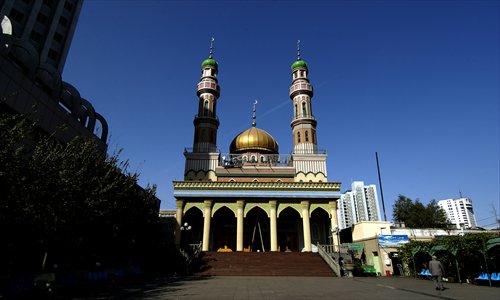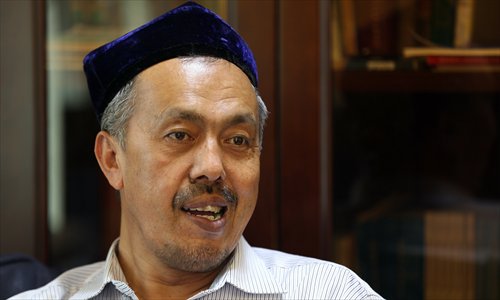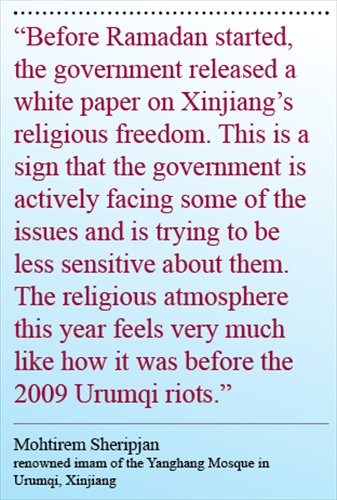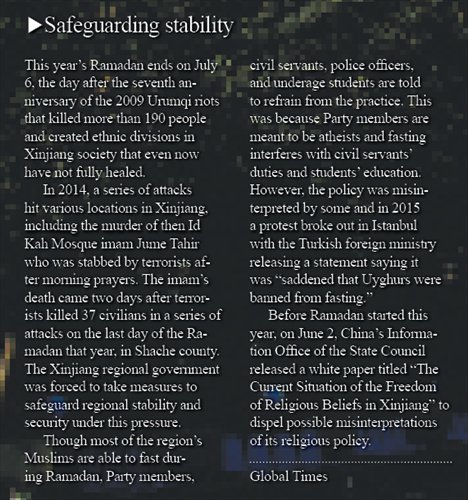Renowned imam talks about improving ethnic ties, Hajj, religious training in Xinjiang

The Yanghang Mosque where Mohtirem Sheripjan currently is an imam Photo: IC
Editor's note:
Mohtirem Sheripjan was born in December 1963 to a renowned religious family in Turpan, the Xinjiang Uyghur Autonomous Region. Seven generations of his family have served as imams in the region and were widely respected. After graduating from high school, Mohtirem followed his father's footsteps and began learning Arabic under his guidance. In 1983, the year his father became the imam of Yanghang Mosque in Urumqi, capital city of Xinjiang, Mohtirem was offered a place at the China Islamic Institute. In 1987 he began studying Arabic and Islamic theology at an Islamic university in Libya. He graduated in 1992 and began working as a teacher at the Xinjiang Islamic Institute. In 2011, Mohtirem replaced his father as the imam of the Yanghang Mosque.
Global Times (GT) reporter Bai Tiantian conducted an interview with Mohtirem Sheripjan during Ramadan, in which he talked about the current situation of Islam in Xinjiang.

Imam Mohtirem Sheripjan says he's responsible in front of both government and Allah. Photo: Cui Meng/GT
GT: Could you give us a brief introduction to this year's Ramadan?
Mohtirem: The atmosphere of this year's Ramadan is more relaxed. First, the China Islamic Association has released a calendar in which the timetable for fasting and prayers are in accordance with the schedule made in the Arab world. The calendar was welcomed by the Muslim community. Second, the government has paid great attention to the holy month of Ramadan. Before Ramadan started, Xinjiang Party chief Zhang Chunxian held a meeting at which he expressed his good will to all Muslims in the region and wished them a pleasant, peaceful Ramadan. On top of these two things, the overall security environment has improved. This year people feel there are fewer disturbances. There have been times, for example in 2014, when there were attacks and the government had to make security arrangements before Ramadan started to protect people's lives.
Our society here in Xinjiang is quite stable right now, as it should be. After the Urumqi riots that took place on July 5, 2009, people have grown quite sensitive and so has our society and government. All these "sensitivities" combined have created complexities. Over the time we have seen improvements, especially this year. Before Ramadan started, the government released a white paper on Xinjiang's religious freedom. This is a sign that the government is actively facing some of the issues and is trying to be less sensitive about them. The religious atmosphere this year feels very much like how it was before the 2009 Urumqi riots.
The Uyghur people in Xinjiang are very friendly. In the past decades, Hans and Uyghurs enjoyed good relations. When I was little, neighbors would give each other food as gifts despite ethnic differences. Whenever there was an emergency, they would come to help. Since the Urumqi riots, the government has made a lot of efforts to improve inter-ethnic relations. Last year Xinjiang Party chief Zhang Chunxian dined with Muslims and religious personnel in a mosque as Ramadan ended. Efforts like this have helped improve ethnic ties.
Overall, I think people in Urumqi are happy with this year's Ramadan. The general Muslim public and religious workers are both satisfied. Religious activities have been carried out according to schedule in various mosques in the region.

GT: What about your mosque? What are your responsibilities as an imam?
Mohtirem: The main hall of our mosque is able to cater about 1,500 people for prayers. But on Fridays, some 4,000 to 5,000 people come to the mosque. In that case some devotees have to pray in the courtyard.
Our mosque is surrounded by schools and government buildings and the people who come to pray at our mosque are relatively better educated. They are willing to listen to me and heed my advice.
As a religious worker, I take responsibility for my work. I am held responsible both in front of the government and before Allah.
GT: How does Xinjiang train religious personnel?
Mohtirem: Before 1949, imams were trained in mosques where they offered Islamic theological courses. After the Cultural Revolution (1966-76), the central government approved the establishment of 11 Islamic institutes across China, one of which was the Xinjiang Islamic Institute. Right now the Xinjiang Islamic Institute is preparing to expand its staff recruitment. This is because the current training capacity cannot fully meet the demand.
For example, Xinjiang currently has some 29,000 religious personnel working in different mosques across the region. Almost all of them are over 40 years old. Because of their age, some 300 vacancies for religious positions emerge every year. If we continue to train imams at a speed of 50 per year with our five-year theological program, we will not be able to meet the demand.
GT: Can we talk a little about government-sponsored education for religious personnel? How are they chosen? How do they find work when they return home?
Mohtirem: Take Egypt as an example. China and Egypt have signed an agreement on cultural exchange and education, which allows a certain number of students to study in Egypt every year. This number will be passed on to the China Islamic Association and then to different regional Islamic institutes. The institutes then help recruit religious students. But the students themselves have to be interviewed at the embassy.
The government sponsors the students. The students are responsible for their academic performance. Once they graduate, they have to look for jobs on their own.
Normally when students graduate from Islamic institutes, their registration certificates will be sent to local committees for ethnic and religious affairs. The committees would make certain arrangement depending on the demand for religious personnel in the area. If a student graduates from a foreign university, he will have to report to the committee for ethnic and religious affairs by himself. The committee then verifies his credentials and make arrangements.
I believe our government is willing to let students study abroad but the quota is indeed limited.
GT: Which countries do these students go to?
Mohtirem: Because of the Arab Spring and other reasons, the Islamic world is experiencing a difficult period. There are countries that have become inconvenient or unavailable. For example, Syria and Iraq are mired in war. Libya is struggling with violent conflicts. There are countries that are relatively stable, say Turkey, but people in Turkey do not speak Arabic. Iran is a Shiite-majority state whereas a majority of Muslims in Xinjiang are Sunni.
GT: Can you talk about pilgrimage in Xinjiang? We read in a previous news report that some Muslims had to bribe local officials to be selected for the Hajj. Is it true? Also Uyghurs are not the only Muslim ethnic group in Xinjiang. How is the quota divided between different ethnic groups?
Mohtirem: I have been on the Hajj a dozen times, mostly working as either translator or a religious counselor and later as a group leader. People who wish to undertake the journey must apply for themselves. As for staff members accompanying the group, they will be selected based on what they can do. For example, medical staff will be selected by the health department and security personnel will be selected by the autonomous region's public security department. There are two key criteria in the selection process - professional skills and experience.
Between 3,600 and 3,700 Muslims from Xinjiang can go to Saudi Arabia on the pilgrimage every year. This number will be further divided between different districts, for example, Hotan may take 400 and Kashgar may take 450. The local committees for ethnic and religious affairs are responsible for arranging the trip.
As for different ethnic groups, the number is divided based on population. For example if a city is comprised of 50 percent Uyghur people and 50 percent Hui people, then half of the pilgrimage quota will go to Uyghur applicants and half to Hui applicants.
Because Saudi Arabia is only able to cater to a certain number of people at the time of the pilgrimage, the number of applications will always exceed the actual number of people who undertake the trip. This is reasonable because too many people trying to take the trip at once would cause safety problems.
As for the bribery issue, yes it could happen at the grass-roots level. However the authorities in Urumqi have in the past two years taken measures to stamp out this phenomenon, which people have welcomed.
GT: In your opinion, what kind of religious atmosphere should Xinjiang cultivate?
Mohtirem: Seven generations of my family served as imams. As an imam myself, I want to spread the peaceful philosophy of Islam to more Muslims through both my words and my deeds.
Some people have issues with their thoughts. It's not merely a problem with actions. There are complicated reasons.

Newspaper headline: A relaxed ramadan